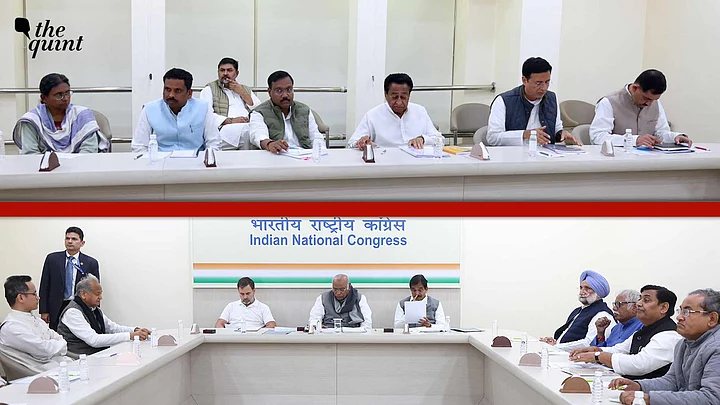Overreliance on big faces, fielding many incumbent MLAs despite unpopularity, lack of a localised campaign and disconnect from the problems on the ground-- these are some of the issues that have been identified by the Congress party in its assessment of its losses in Rajasthan, Madhya Pradesh and Chhattisgarh.
The three states went to polls in November and the Congress was confident of winning at least two — MP and Chhattisgarh. The top leadership has now been huddling together to figure out what went wrong in its preparation ahead of the polls. Over the past weekend, Congress president Mallikarjun Kharge and party leader Rahul Gandhi met with leaders of the state, including the state in-charges, to take stock of the situation.
Here are some of the issues that came up.
Primary Problem In Rajasthan
In Rajasthan, the one clear fact that emerged was that the party paid a heavy price for its unwillingness to let go of sitting MLAs and ministers. The party fielded at least 50 sitting MLAs and 25 ministers. Of the 25 ministers, 17 lost. Ground reports and internal party surveys both suggested that many incumbents are unpopular in their constituencies, but the party still fielded them again. One reason for this could well be the fear of a rebellion, and the need to quell it ahead of time. Even top leaders like CP Joshi, the assembly speaker, failed to retain their seats. Congress managed to win 69 seats in Rajasthan while the BJP won 115 even though the party gained in terms of vote share.
There was also talk of how a continued tussle between CM Ashok Gehlot and former deputy CM Sachin Pilot may have cause the voter to feel unsettled and put off by the party. There has been no discussion on the face of the leadership in the state and if it requires to be changed, as of now. Both Gehlot and Pilot were part of the meeting.
The Diagnosis In Madhya Pradesh
In Madhya Pradesh, there was too much reliance on perceived anti-incumbency against the BJP government, which led to complacency setting into the party’s campaign, the consensus emerged. State leaders were appreciated for their individual rallying and campaign, but much of it was limited to countering or reacting to the BJP’s agenda, and not to present a positive or active campaign of one’s own.
In Madhya Pradesh too, the Congress was reduced to double digits— 69 —while BJP won 163 seats. AICC general secretary in-charge of Madhya Pradesh Randeep Surjewala was also present at the meeting, besides state leaders Kamal Nath and Digvijaya Singh.
Nath, who is former CM of the state and also the present MPCC president, is likely to step down from the post, in light of the election loss.
Accusations Against Leadership In Chhattisgarh
In Chhattisgarh, the Congress’ tally reduced to 35, a stark contrast with the 68 seats the party won back in 2018. Like Madhya Pradesh, here too the Congress was fairly confident of winning the polls, albeit by a small margin. But in the days after the results, multiple former MLAs have levelled allegations at the state leadership including former CM Bhupesh Baghel, TS Singh Deo as well as AICC in-charge Kumari Selja regarding ticket distribution and candidate selection. In the meeting about the Chhattisgarh results, these statements and accusations by the Congress members was also discussed.
“Power remained centralised and the CM worked with some selected people for the entire five years. The atmosphere of tussle persisted," Congress leader and outgoing minister Jai Singh Agrawal told reporters earlier this week. “It seems our 'mukhiya' believed we would win all rural seats and there would not be much need for urban seats," said Agrawal who incidentally lost his own election too.
Another sitting MLA Brihaspat Singh, specifically blamed Selja for the defeat. Singh said, “22 tickets were denied (to worthy candidates)... Our state’s AICC in-charge was biased,” said Singh, who was denied a ticket himself.
Speaking to reporters after her meeting with the high command, Selja defended the party’s performance in the state, especially pointing out the figure of women candidates who won. “We gave tickets to 18 women, out of which 11 won. The media, agencies and everyone said we were winning in Chhattisgarh, and to some extent they were right as our vote percentage did not change much. There are plenty of reasons which are being reviewed. We have not lost the trust of the people. We will win more seats in the Lok Sabha elections.”
The Congress party’s vote share has dropped only marginally in Madhya Pradesh and Chhattisgarh, and has in fact increased in Rajasthan, in comparison to 2018. This is when Congress had won all three states in 2018. The Congress’ vote share has dropped from 40.9 per cent to 40.4 per cent in Madhya Pradesh, and from 43 per cent to 42.2 per cent in Chhattisgarh. The Congress’ vote share has increased in Rajasthan from 39.3 per cent in 2018 to 39.53 per cent in 2023.
